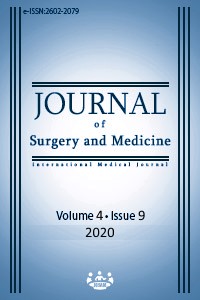The relationship between sarcopenia and cognitive dysfunction in bladder tumor patients
Keywords:
Sarcopenia, Geriatrics, Gerontology, CognitionAbstract
Aim: There is no study in the literature to show whether there is a negative effect of sarcopenia on cognitive functions in patients over 65 years of age in the early postoperative period, who were operated under general anesthesia. The aim of this study was to determine the relationship between sarcopenia and cognitive dysfunction in the early postoperative period of transurethral resection of bladder tumor operation in the elderly population with bladder cancer. Methods: The cognitive functions of patients over the age of 65 years who underwent transurethral resection of bladder tumor were evaluated before and 24 hours after the surgery with mini-mental tests in this single center, cross sectional study. All patients underwent a preoperative gait test and muscle mass was measured. The muscle strength of the patients with walking speed >0.8 m / sec in the walking test was measured by hand grip dynamometer. Low walking speed and muscle mass, and normal walking speed, but with low handgrip power and muscle mass were the accepted criteria of Sarcopenia. Results: In the early postoperative period, a decrease in cognitive functions was observed in the population of 54 geriatric patients, 43 of whom were male. The mean age was 74 years in both sarcopenic and non-sarcopenic groups. Cognitive dysfunction was more common in the sarcopenic patient group of 15 patients in the early postoperative period compared to the non-sarcopenic group of 39 patients (P=0.001, P=0.026 respectively). However, this decrease in cognitive function in sarcopenic patients was not statistically significant compared to non-sarcopenic patients (P=0.644). Conclusion: We demonstrated that cognitive functions decreased in early postoperative period in the geriatric patient population. The decrease in postoperative cognitive functions in sarcopenic patients was higher than that in non-sarcopenic patients, although the difference was not statistically significant. Therefore, larger studies with more patients are needed to achieve a statistically significant difference.
Downloads
References
Chang KV, Hsu TH, Wu WT, Huang KC, Han DS. Association Between Sarcopenia and Cognitive Impairment: A Systematic Review and Meta-Analysis. J Am Med Dir Assoc. 2016 Dec 1;17(12):1164.e7-1164.e15. doi: 10.1016/j.jamda.2016.09.013. Epub 2016 Nov 2.
Buch A, Carmeli E, Boker LK, Marcus Y, Shefer G, Kıs O, et al. Muscle function and fat content in relation to sarcopenia, obesity and frailty of old age. An overview. Exp Gerontol. 2016;76:25e32.
Han DS, Chang KV, Li CM, Lin YH, Kao TW, Tsai KS, et al. Skeletal muscle mass adjusted by height correlated better with muscular functions than that adjusted by body weight in defining sarcopenia. Sci Rep. 2016;6:19457.
Pagotto V, Silveira EA. Methods, diagnostic criteria, cutoff points, and prevalence of sarcopenia among older people. Sci World J. 2014;2014:231312.
Budui SL, Rossi AP, Zamboni M. The pathogenetic bases of sarcopenia. Clin Cases Miner Bone Metab. 2015;12:22e26.
Yanai H. Nutrition for sarcopenia. J Clin Med Res. 2015;7:926e931.
Peterson SJ, Braunschweig CA. Prevalence of sarcopenia and associated outcomes in the clinical setting. Nutr Clin Pract. 2016;31:40e48.8
Cabett Cipolli G, Sanches Yassuda M, Aprahamian I. Sarcopenia Is Associated with Cognitive Impairment in Older Adults: A Systematic Review and Meta-Analysis. J Nutr Health Aging. 2019;23(6):525-31. doi: 10.1007/s12603-019-1188-8.
Tolea MI, Galvin JE. Sarcopenia and impairment in cognitive and physical performance. Clin Interv Aging. 2015 Mar 30;10:663-71. doi: 10.2147/CIA.S76275. eCollection 2015.
Landi F, Cruz-Jentoft AJ, Liperoti R, Russo A, Giovannini S, Tosato M, et al. Sarcopenia and mortality risk in frail older persons aged 80 years and older: Results from ilSIRENTE study. Age Ageing. 2013;42:203e209.
Fried LP, Tangen CM, Walston J, Newman AB, Hirsch C, Gottdiener J, et al. Frailty in older adults. J Gerontol Ser A Biol Sci Med Sci. 2001;56:146e157.
Landi F, Cesari M, Calvani R, Cherubini A, Di Bari M, Bejuit R, et al. The "Sarcopenia and Physical fRailty IN older people: multi-componenT Treatment strategies" (SPRINTT) randomized controlled trial. Aging Clin Exp Res. 2017 Feb;29(1):89-100. doi: 10.1007/s40520-016-0715-2. Epub 2017 Jan 31.
Chen K, Wei P, Zheng Q, Zhou J, Li J. Neuroprotective effects of intravenous lidocaine on early postoperative cognitive dysfunction in elderly patients following spine surgery. Med Sci Monit. 2015 May 15;21:1402-7. doi: 10.12659/MSM.894384.
Shan X, Zhang X, Li X, Xu G, Li Z. Effect of ulinastatin on postoperative cognitive function in the elderly with fracture. Zhonghua Yi Xue Za Zhi. 2015 May 26;95(20):1586-9.
Downloads
- 522 1004
Published
Issue
Section
How to Cite
License
Copyright (c) 2020 Semih Kalyon, Perihan Özkan Gümüşkaya, Neslihan Özsoy, Mustafa Özcan, Şengül Aydın Yoldemir, İlkim Toprak, Özgür Altun, Murat Akarsu, Eylem Özgün Çil, Yücel Arman, Tufan Tükek
This work is licensed under a Creative Commons Attribution-NonCommercial-NoDerivatives 4.0 International License.
















